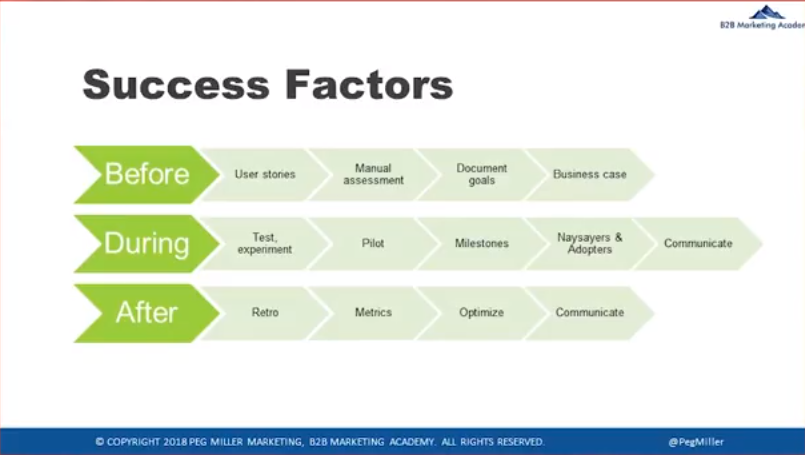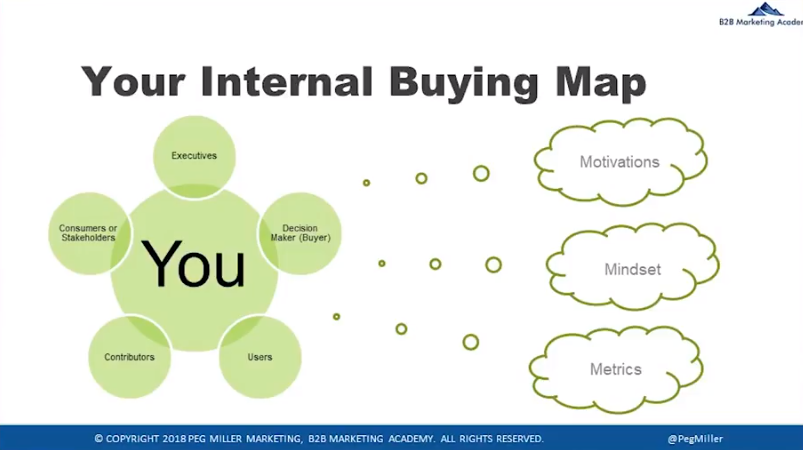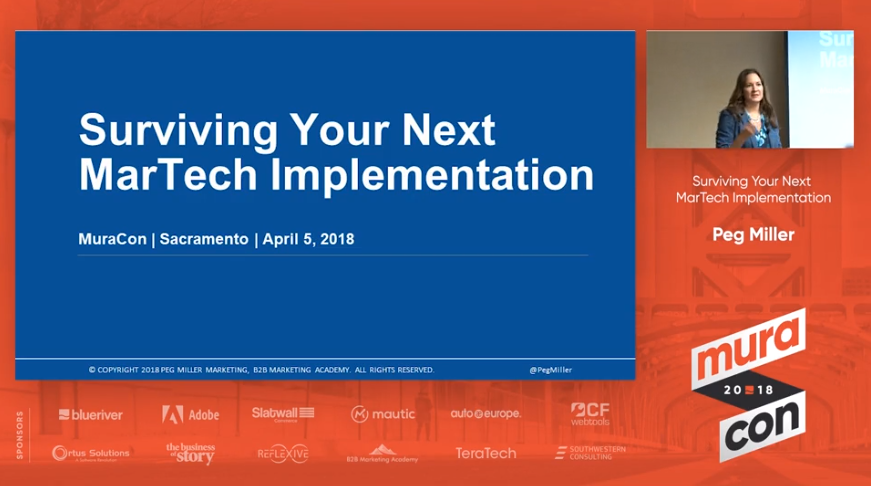Do you have clothes in your closet that you’ve just never worn? For a lot of companies, that t-shirt with the tags still on it is a lot like some of their marketing technology - purchased with the best intentions, but never used.
In fact, 56% of organizations report underutilizing their marketing technology; 21% of companies have platforms or tools they've purchased that aren't being used at all; and only 9% of marketing departments say they have all of the marketing tools they need and fully use them.
“As marketers, we’re now spending more on technology than the CIOs are,” Co-Founder of B2B Marketing Academy Peg Miller says. “But we don’t really know how to buy technology and implement it. We’re better at being marketers than we are at rolling out and implementing technologies through our organization.”
So how can we better prepare ourselves and better prepare our teams for more successful martech implementations?
Team Prep
“I always like to encourage people to think about their martech implementations both in the before, the during, and the after,” Miller says. “Because often times we rush forward into the decision and we forget to do the team prep.”
Looking at all three stages of a technology implementation is key to its success.

The key to a successful implementation before, during, and after is keeping the right people involved and constantly communicating.
Miller suggests taking a look at your internal buying map and at your organization and then prepping the right people on what is to come with the implementation. “Different people are going to have different needs from the technology,” Miller says. “If you, as the project manager, aren’t handling all these different constituents and kind of managing them appropriately, you’re leaving yourself exposed for any fail points throughout the process.”

“It’s your job as that project owner or implementer to fulfill the promises that you sold everybody on early on in the process,” Miller says.
And how do you deliver on those promises? There’s no doubt that the martech industry is jam-packed with vendors, but not all created equally. Miller says choosing the right technology starts with asking each vendor the right questions right off the bat to better evaluate.
Considerations for any Martech Vendor
- History
- How long has this business been in the market?
- Experiences with (enterprise, mid-market, small) companies?
- Look for fit and experience with similar size company or processes
- Support and Service
- Is support free or fee? Levels?
- Services - free or fee?
- Access to support, service resources?
- Get recommendations for your specific use case
- Customers
- How many customers?
- Retention rate
- Referenceable customers, like you
- Post-Sale
- Transition from sales to post-sale?
- Who will be assigned to your account?
- Beware A-team for sales and then ignore
- Analytics, Reporting
- Out of box vs custom?
- Self-serve reports, easy to create?
- Including push/pull to stakeholders? Custom dashboard?
- Monthly snapshots, comparisons?
- Custom reports, ease of development?
- Feedback Loop
- Feedback channel and feature requests?
- Community, a user summit or other ways users can share ideas?
- Resources
- Will the tool require a central administrator?
- Can your team use the tool on their own?
- Big Q: Will your team use it?
- How will the tool help your team be better at their job?
- Planning and Budgeting: Technical, human resources? Migration, integration?
- Qualitative
- References
- Vendor’s own content
- Ask questions, check references
- Social media, review sites
- RFP - how they behave during the RFP process will give you clues. Speed, ease, communication.
- Test, pilot, trial
Marketers must come to the table prepared when evaluating potential martech vendors. This list of questions should help you avoid “not knowing what you don’t know,” which can lead to overlooking huge pitfalls of the technology.
But once you’ve decided to move forward, it’s just as important to know what pitfalls might lie ahead. “Now we’ve made the decision, we’ve gone through our manual process, we’ve said, ‘Yep, we’ve got a situation on our hands that can be solved by this technology.’”
Avoid Common Implementation Pitfalls
People and process first, then technology.
“The pitfall that I see most commonly, people just keep tripping on it, is thinking that the technology is going to solve the problem,” Miller says. “It helps, certainly, but you still have to understand your processes and you still have to put your team through some change management preparation and you still have to manage the project.”
- Reduce, don’t add.
- Know the user payoff.
- Simple wins!
- Do just enough analysis.
- Buyers are rarely users.
In the end, there are many reasons why marketing technology goes unused, from systems that aren’t intuitive and easy to use, to lack of training and failure of users to adopt. Marketers cannot just buy platforms and expect successful implementations. By preparing your team, developing the process, getting buy-in from the people that will be using the technology and then making the right technology decision by thoroughly vetting your vendor, you’ll be better equipped to survive your next MarTech implementation.
More from Peg Miller and Blueriver
Marketing technology decisions impact our teams before, during and after implementation.
In this online presentation, Peg Miller discusses asking the right questions of your vendor to make better MarTech decisions, identifying and avoiding common pitfalls, and setting your team up for success when adopting new marketing technologies.
